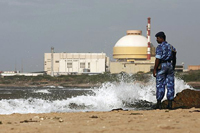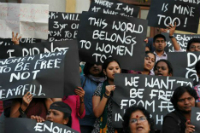The mystery behind the latest Kudankulam delays

India's internal politics may be responsible for delays in commissioning Kudankulam's first unit. Source: Flickr/sunlat
As early as November 2012, Russian diplomats maintained that the first reactor of the Kudankulam Nuclear Power Project (KNPP) was ready and that it was just a matter of time before it went live. Then there was a lot of speculation in the media that the reactor would be commissioned during Vladimir Putin’s December visit to India, more as a symbolic gesture to add substance to the summit. We’re moving towards the end of the first month of this New Year and there’s still no official word as to when the reactor goes live.
There are several conspiracy theories doing the rounds in Indo-Russian circles. One such theory is that the Nuclear Power Corporation of India Ltd (NPCIL), which constructed the reactor along with a Rosatom subsidiary, is stalling the commissioning after KNPP employees received an anonymous threat sent via a postcard from Chennai. The letter, most likely the handiwork of the so-called People's Movement Against Nuclear Energy, says: “Neither you nor your wife and children enjoy the three-stage protection of the nuclear plant. If we desire, we could kidnap, murder and throw you and your family into the sea. Better, you leave the place along with your family to your native places or countries.” The movement, which is widely regarded as a front for corporate saboteurs from the West, has denied sending the letter but continues to be a nuisance for the KNPP staff.
Sources close to both the Russian and Indian sides have dismissed the fact that the threat has anything to do with the delays. There are definitely other factors at work. A Russian official, on the condition of anonymity, says that some of his compatriots working on the project are starting to get frustrated with the delays, which they see as illogical considering the fact that the reactor “can easily go live at the moment.” The chairman of India’s Atomic Energy Corporation (AEC) told The Hindu that the authorities wanted the systems to work “exactly textbook like” before the commissioning. The Russian official, who spoke off the record, disagrees with the AEC chairman’s statements and suggested that internal politics caused the latest stalling.
Regional politicians in India are looking to gain some political points off the project. J. Jayalalitha, the chief minister of Tamil Nadu (which hosts the plant), was initially reluctant to take action against the anti-Kudankulam activists looking at them as a potential vote-bank. She now sees the project as a great way of winning political brownie points and has insisted that the entire thousand megawatts produced by the reactor go to her state. Other peninsular Indian states justifiably want their fair share from the project. Kerala, whose capital Trivandrum is closer to Kudankulam than Chennai, is expecting some power from the reactor.
Sources say the Indian central government is working behind the scenes to arrive at an acceptable political solution to keep the southern politicians happy, knowing that alliances will play a huge role in retaining power after the 2014 general elections. This has got to frustrate the Russian side, which is eager to tout the operation of the first unit as another major achievement in Indo-Russian cooperation.
Russia is learning the hard way that doing business in India comes with the baggage of dealing with the complicated internal political dynamic of the country. Moscow has every right to be unhappy about the way Sistema’s licenses were cancelled for absolutely no fault of the Russian company. While reports suggest that the 2G license imbroglio is likely to be solved in the near future, there’s no guarantee that other major projects/investments involving Russian companies in India won’t get dragged into the muck created by the sharp political divide in India. It is in New Delhi’s best interests to get the first KNPP reactor commissioned and to ensure that work on the second reactor moves on unhindered. The real beneficiaries of the KNPP are the ordinary and hard-working citizens of southern Indian states, who deal with power cuts almost on a daily basis.
All rights reserved by Rossiyskaya Gazeta.
Subscribe
to our newsletter!
Get the week's best stories straight to your inbox

